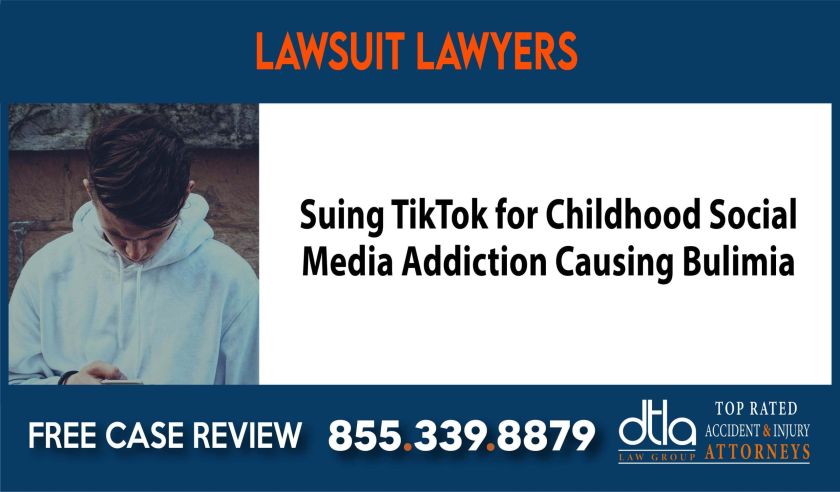Suing TikTok for Childhood Social Media Addiction Causing Bulimia – Lawsuit Attorney
Do you have a child who was diagnosed with bulimia nervosa due to their addiction to eating disorder content on TikTok? Did you end up with an eating disorder because of harmful content on TikTok that promoted unhealthy diet and exercise habits? This is a tragic, but all too common situation that many kids end up in due to the pro-mia (bulimia) videos and images that they come across on a daily basis. In fact, childhood social media addiction causing anorexia, bulimia, suicide, and attempted suicide has increased dramatically in the past 7 years or so. Bulimia, in particular, is extremely difficult to overcome, as it’s related to self-worth and flaws that exist only in the patient’s mind.
You have probably heard of social media companies proudly declaring their commitment to keeping dangerous content off their site and protecting those who are underage. But here’s the reality: TikTok, Instagram and Facebook have known for years that children 13 and younger were accessing content related to eating disorders. But they did virtually nothing to prevent this content from being recommended to underage users. If anything, they used advanced algorithms to push this content onto children who were looking up things that were tangentially related to disordered eating, body dysmorphia, and other controversial subjects.
As a result, many kids were left with severe psychological trauma that will stay with them for the rest of their lives. This is a clear indication of negligence by a social media platform when it comes to the protection of minors from pro-bulimia and related eating disorder imagery and videos. Perhaps you are a survivor of childhood social media addiction that led to an eating disorder. Alternatively, you are a parent that lost a child to complications from bulimia or suicide over self-image issues. We can help you get justice for the harm you’ve suffered by filing a social medial harm lawsuit against TikTok.
Contact us right away to learn more about suing a social media site for promoting content related to eating disorders such as bulimia, anorexia, pica, and binge eating disorder.

$2.5 Million
$2,287,495
$54 Million
$22 Million
$1.9 MIllion
$1.5 Million
$600,000
$1,975,000
Bulimia nervosa is a life-threatening eating disorder that’s characterized by binge eating, followed by purging, often in the form of vomiting. However, bulimics can also purge using laxatives, enemas, or diuretics. They may also engage in fasting, excessive calorie restricting, and over-exercising.
Despite the focus on food, bulimia is really about self-image and the preoccupation with perceived flaws. Those who are bulimic may exhibit the following symptoms:
- An all-consuming fear of gaining weight
- Preoccupation with body shape and losing weight
- Eating abnormally large amounts of food in one sitting
- Secret binge eating (eating alone late at night, for example)
- Excessive use of dietary aides like pills, teas, and laxatives
- Forcing yourself to throw up after eating in order to prevent weight gain
- Physical changes in the body, like swollen hands and feet, swelling in the cheeks, and sores, calluses, and scars on the hands or knuckles.
The severity of the illness is based on how many times you purge in one week. Purging at least once a week for 3 or more months is the basis for a diagnosis of bulimia. The disease is more prevalent in females, though males are under increasing pressure to keep the pounds off and maintain a toned physique. This is largely due to social media posts on sites like TikTok, though most adults understand that a lot of these images are Photoshopped or altered in some other way. However, children are likely to believe that what they’re seeing is true to life, which is why social media sites need to keep eating disorder content off their platform.
Can I Sue TikTok for Causing my Child to Develop an Eating Disorder?Yes, you can file a lawsuit for an eating disorder against a social media company that failed in its duty of care to protect a minor from harmful images, videos, and other types of content. We know, for example, that TikTok was fully aware of kids suffering from body dysmorphia and dangerous dieting due to the content they were accessing on the platform. In fact, they knew about this as early as 2016, but they keep feeding kids content that deepened their addiction and psychological trauma from bulimia, anorexia, and suicidal thoughts.
TikTok’s conduct constitutes negligence by a social media company, and this is the basis for a personal injury lawsuit. But understanding how social media algorithms work, what TikTok was aware of, and how a child’s psychological state is affected by content about bulimia are incredibly complex issues. Our legal experts are here to answer your questions and talk to you about the legal actions you can take. Contact DTLA Law Group and learn about your rights and legal options during a free consultation.
Settlement Value of a Harmful Content Lawsuit against TikTokYou can receive $250,000 to $3,000,000 on average for a child media addiction resulting in bulimia lawsuit. However, possible settlement amounts can range from $10,000 to $50,000 on the lower end, and over $5,000,000 for the most extreme cases of injury. Wrongful death lawsuits for deaths caused by harmful social media content may be worth between $1,500,000 and $5,000,000. However, wrongful death case values are based on numerous factors, including the age of the child, the severity of their illness, and the cause of death.
As you can see, there is a lot to examine before we can come up with a settlement value for a childhood eating disorder lawsuit against TikTok. If you need help figuring out the amount of compensation for a personal injury or negligent death lawsuit, call us to schedule a free case review.
How Long will it Take to Recover my Payment?Harmful content lawsuits against social media companies take 10 to 24 months to resolve, depending on many factors that are unique to each case. It’s possible that a settlement will be reached in 6 months, but these cases involve complex technology and legal concepts, not to mention, a relatively new field of personal injury law. That’s why we anticipate most of these cases taking around 1 to 2 years, though much of the timeline depends on TikTok’s willingness to work towards a fair settlement offer. Though it’s rare, a small percentage of these cases are tried in court. If that happens, it may be 3 or more years before a TikTok eating disorder lawsuit is settled.
Lawsuits for harmful social media content that led to an eating disorder must be filed within 2 years, either from the date of injury or the date of death if the child passed away from suicide or bulimia-related complications.
Typically, lawsuits are filed by an adult representing the child, i.e., a parent or legal guardian. However, a minor also has 2 years from their 18th birthday to sue TikTok for dangerous eating habits. There may be other issues in your case that impact how long you have for a lawsuit, so please contact us to verify the statute of limitations for a social media eating disorder claim.
Legal Advice from a Social Media Eating Disorder LawyerThere are many aspects of social media that can spin out of control and cause permanent damage to an innocent child. Though parental supervision is part of the answer, companies like TikTok also have a duty to protect minors from harmful pro-mia and pro-ana content.
Our law firm is committed to achieving justice on behalf of those who developed an eating disorder due to childhood social media addiction. In addition, we believe victims and their family members should not have to pay for the cost of legal representation. That’s why we bill TikTok for the cost of legal fees, which is paid to us at the same time you receive your settlement. In short, winning your case is the only way we get paid, so you will never pay out of pocket if you decide to hire us.
Contact the offices of DTLA Law Group and schedule a free case evaluation with a social media harm lawsuit attorney.










